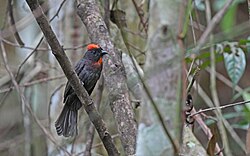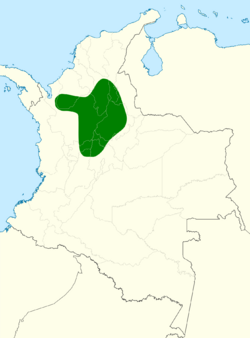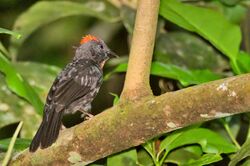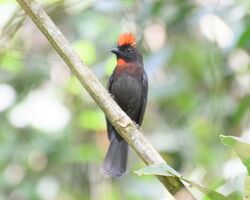Biology:Sooty ant tanager
| Sooty ant tanager | |
|---|---|

| |
| Scientific classification | |
| Domain: | Eukaryota |
| Kingdom: | Animalia |
| Phylum: | Chordata |
| Class: | Aves |
| Order: | Passeriformes |
| Family: | Cardinalidae |
| Genus: | Habia |
| Species: | H. gutturalis
|
| Binomial name | |
| Habia gutturalis (Sclater, PL, 1854)
| |

| |
The sooty ant tanager (Habia gutturalis) is a species of bird in the cardinal family (Cardinalidae); formerly, it was placed with the true tanagers in the family Thraupidae.
It is endemic to Colombia. Its natural habitats are subtropical or tropical moist lowland forest and secondary forest. It is becoming rare due to habitat loss.
Taxonomy
The bird was first formally described in 1854 by the English zoologist Philip Sclater.[2] The binomial name derives from the Guaraní name habia for various finches and tanagers, and the Latin word gutturalis which means "of the throat".[3] The sooty ant tanager is a monotypic species.
Description
19-20 cm in length. The adult male is dark grey with a conspicuous scarlet crest (not always raised) and a rosy-red throat. The adult female is duller with a pinkish-white throat.[4]
Distribution and Habitat
This bird is found in northwest Colombia, occurring in the Upper Sínu Valley at the northern end of the western Andes, and east along the north base of the Andes to the middle Magdalena River Valley.
Its natural habitat is humid tropical forests, edges, gaps and mature secondary forest. It prefers dense streamside and landslide habitats in extensive unbroken forest.[4]
References
- ↑ BirdLife International (2021). "Habia gutturalis". IUCN Red List of Threatened Species 2021: e.T22722423A190930538. doi:10.2305/IUCN.UK.2021-3.RLTS.T22722423A190930538.en. https://www.iucnredlist.org/species/22722423/190930538. Retrieved 1 January 2022.
- ↑ Sclater, P.L. (1854). "On a New Species of Tanager in the British Museum". The Annals and Magazine of Natural History VIII, Second Series: 24–25. https://www.biodiversitylibrary.org/item/72154#page/7/mode/1up. Retrieved 12 January 2021.
- ↑ Jobling, James A. (2010). Helm Dictionary of Scientific Bird Names. London: Christopher Helm. pp. 182, 184. ISBN 978-1-4081-2501-4.
- ↑ 4.0 4.1 Restall, Robin; Rodner, Clemencia; Lentino, Miguel (2006). Birds of Northern South America: an Identification Guide. New Haven: Yale University Press. pp. Vol 1 p676. ISBN 978-0-300-10862-0.
Wikidata ☰ Q1302555 entry
 |




